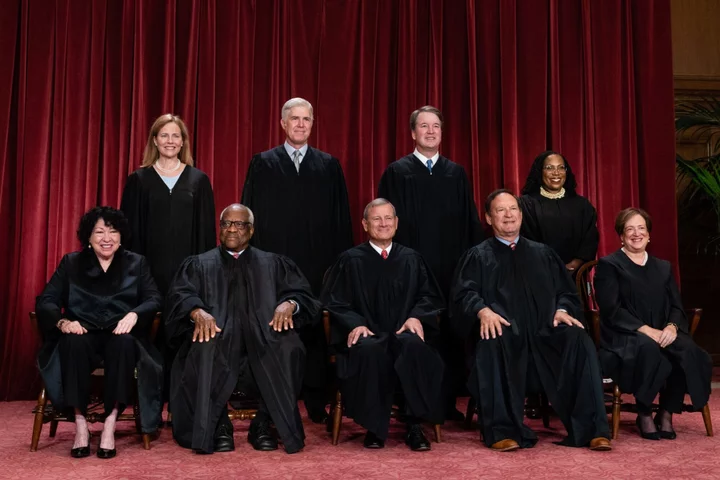The US Supreme Court waited until the end of its nine-month term to remind the country just how much muscle its 6-3 conservative majority has.
In a trio of rulings Thursday and Friday, the justices outlawed the use of race in college admissions, struck down President Joe Biden’s student-loan relief plan and crafted a First Amendment exception to anti-discrimination laws.
The decisions shifted the trajectory of a term that until then had featured more conservative setbacks than victories. Operating under the shadow of ethics controversies and questions about its institutional credibility, the court managed to avoid “major upheavals” for much of the term, said David Strauss, a constitutional law professor at the University of Chicago School of Law.
“Then in the last week, in the cases in which there was probably the sharpest disagreement among the justices, the conservative majority reasserted itself in a much more aggressive way,” Strauss said.
Each of the three rulings, issued Thursday and Friday, was far-reaching in its own way. The admissions decision nullified almost a half century of precedents that had let universities consider race as an admissions factor for the sake of ensuring diverse student bodies.
The student-loan ruling wiped out a plan that would have canceled at least some loans for more than 40 million people. It marked the latest in a series of decisions that have struck down Biden administration policies as overstepping the executive branch’s authority.
And the First Amendment ruling, which favored a Colorado web designer who wanted to create web pages only for opposite-sex marriage, dealt a blow to LGBTQ rights eight years after the court’s landmark decision legalizing same-sex marriage nationwide.
“As a Black, lesbian woman this has been an incredibly tough week,” said Stasha Rhodes, campaign director for United for Democracy, a coalition calling for Congress to rein in the Supreme Court. She said the court in the Colorado case “once again ignored long-standing precedent to impose its own right-wing agenda.”
The justices capped the week by announcing new cases they will hear when they return in October, when fights over gun rights and federal regulatory power will top the agenda.
Supreme Discord
The rulings came amid a swirl of ethics controversies — including revelations that Republican megadonors bankrolled luxury vacations for Justices Clarence Thomas and Samuel Alito — and a slide in public confidence since last year’s leak of the court’s opinion overturning the constitutional right to abortion.
In his student-loan opinion, Chief Justice John Roberts hinted at the discord that has surfaced among the justices.
“It has become a disturbing feature of some recent opinions to criticize the decisions with which they disagree as going beyond the proper role of the judiciary,” he wrote.
Roberts quickly said he wasn’t criticizing the tone of Justice Elena Kagan’s dissent in that case.
“We do not mistake this plainly heartfelt disagreement for disparagement,” Roberts wrote. “It is important that the public not be misled either. Any such misperception would be harmful to this institution and our country.”
Roberts, who has tried to defend the court’s institutional standing, found himself embroiled in controversy because of his colleagues’ alleged ethical transgressions and the lack of any binding code of conduct for the justices. Democrats criticized him in April when he declined a request to testify about ethics before a Senate panel.
Election Rulings
Big though they were, the three final-week rulings were among only five that found the six conservatives in the majority and the three liberals in dissent.
“Insofar as there was a narrative about a 6-3 conservative majority that could and would follow a particular playbook across the board, that narrative didn’t hold up,” said Rick Garnett, a professor at Notre Dame Law School.
In cases involving election law, immigration, Native American law and even abortion, Roberts and Justice Brett Kavanaugh sided with the liberal wing, as the court stuck by its precedents, eschewed sweeping legal changes and in some cases rejected once-fringe legal theories pressed by eager conservatives.
The pullback was especially notable in election law. The court ruled that the Voting Rights Act required Alabama to have a second heavily black congressional district – even though 16 months earlier, the justices had blocked a ruling that would have meant a second district for the 2022 election.
The difference was Kavanaugh. In the February 2022 emergency order, he said it was too close to the election for federal courts to order a state to redraw its voting districts. But after full briefing and arguments he joined Roberts and the three liberals to reaffirm a 1986 precedent that minority groups have long used to combat discriminatory voting lines.
The court later rejected a sweeping Republican-backed argument that would have transformed federal election law and ousted state judges and other officials from longstanding roles.
“My big takeaway is that the status quo generally remained and that the court refused to go to the extreme in these cases,” said Joshua Douglas, a professor at the University of Kentucky’s Rosenberg College of Law and an expert in election law. “It’s not so much that they are being more protective of voting rights; instead, the theories the plaintiffs presented were just so radical.”
Immigration and Abortion
Liberals were similarly concerned the court might invalidate at least part of the 1978 Indian Child Welfare Act, which gives preference to Native Americans in adopting and fostering tribal children. The court instead voted 7-2 to uphold the broad parameters of the law while saying the challengers — Texas, three non-Native couples and the biological mother of an American Indian child – didn’t have legal standing to press some of their arguments.
Standing emerged as a critical concept in the term, giving the court a way to sidestep some – but not all – politically charged issues. In an 8-1 decision, the court said Texas and Louisiana lacked standing to challenge Biden’s shift of immigration enforcement priorities, describing the suit as the kind “federal courts have not traditionally entertained.”
The court went the other way on standing in striking down Biden’s student-loan relief, concluding that at least one of the six Republican-led states did have standing. Kagan, in her dissent, argued that the states didn’t have standing because they weren’t directly financially harmed. “And in our system, that means refusing to decide cases that are not really cases because the plaintiffs have not suffered concrete injuries,” she wrote.
The court also sided with stability in a challenge to the widely used abortion pill mifepristone. Over two dissents, the court blocked judge-imposed restrictions that the Biden administration said would have made it impossible to legally sell the drug across state lines in the near term. That case could return to the court in its next term.
“Unlike last year, when you could plausibly argue most of the major cases were won by the political right, this year you cannot say that,” said Ilya Somin, a professor at George Mason University’s Scalia School of Law.
Regulatory Power
Until the final days, the biggest conservative victories came in the realm of regulatory power. A Clean Water Act ruling slashed the power of federal regulators over wetlands, eliminating protections for tens of millions of acres.
And critics of federal regulatory power won a unanimous decision affecting the Securities and Exchange Commission and Federal Trade Commission. The justices said companies and people facing agency investigations or complaints can go straight to federal court with some constitutional challenges, including attacks on the use of in-house judges to handle cases.
“This was a good term for stronger judicial review of the administrative state,” said Curt Levey, president of the conservative legal advocacy group Committee for Justice.
Levey said he was happy with the term, even if the results weren’t always what rank-and-file conservatives might have wanted.
“We all have to understand that a court that is jurisprudentially conservative is a lot of the time going to produce outcomes that leave the base unhappy,” he said. “We don’t want a conservative activist court that always gives us the outcome that we want.”
--With assistance from Kelsey Butler.









